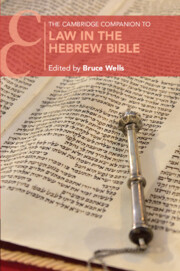Book contents
- The Cambridge Companion to Law in the Hebrew Bible
- Cambridge Companions to Religion
- The Cambridge Companion to Law in the Hebrew Bible
- Copyright page
- Contents
- Contributors
- Abbreviations
- Introduction
- Part I The Historical Context of Biblical Law
- Part II The Biblical Legal Collections
- 3 The Nature of the Collections
- 4 The Origins of the Laws
- 5 The Narrative Context of the Collections
- Part III The Biblical Laws
- Part IV Biblical Law and Other Scriptural Discourses
- Part V The Legacy of Biblical Law
- Bibliography
- Subject Index
- Text Index
- Cambridge Companions To Religion (continued from page iii)
- References
3 - The Nature of the Collections
from Part II - The Biblical Legal Collections
Published online by Cambridge University Press: 11 April 2024
- The Cambridge Companion to Law in the Hebrew Bible
- Cambridge Companions to Religion
- The Cambridge Companion to Law in the Hebrew Bible
- Copyright page
- Contents
- Contributors
- Abbreviations
- Introduction
- Part I The Historical Context of Biblical Law
- Part II The Biblical Legal Collections
- 3 The Nature of the Collections
- 4 The Origins of the Laws
- 5 The Narrative Context of the Collections
- Part III The Biblical Laws
- Part IV Biblical Law and Other Scriptural Discourses
- Part V The Legacy of Biblical Law
- Bibliography
- Subject Index
- Text Index
- Cambridge Companions To Religion (continued from page iii)
- References
Summary
This chapter introduces the biblical law collections or codes: the Ten Commandments, the Covenant Collection, the Priestly Collection, the Holiness Collection, and the Deuteronomic Collection. It examines whether they come from a particular source, whether they should be considered mainly legal or literary works, and whether later collections sought to revise or reinterpret earlier ones.
- Type
- Chapter
- Information
- The Cambridge Companion to Law in the Hebrew Bible , pp. 55 - 75Publisher: Cambridge University PressPrint publication year: 2024

